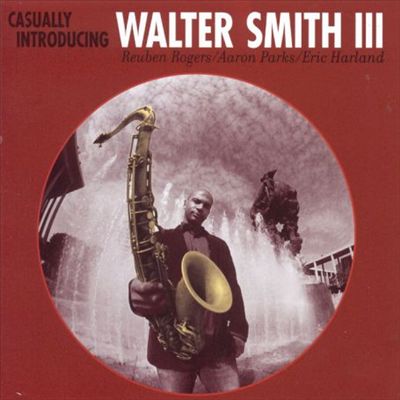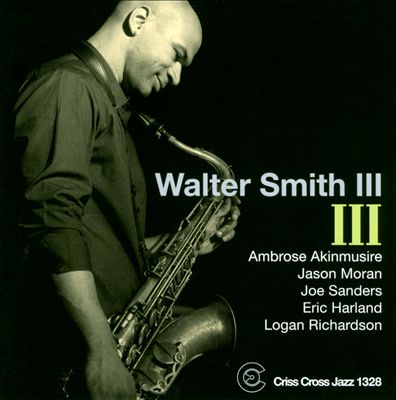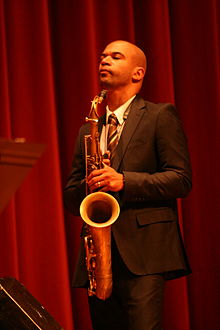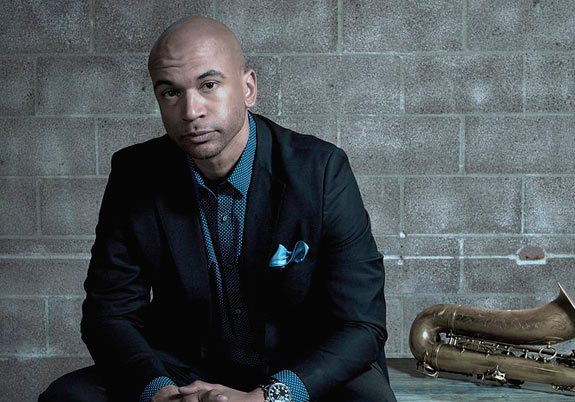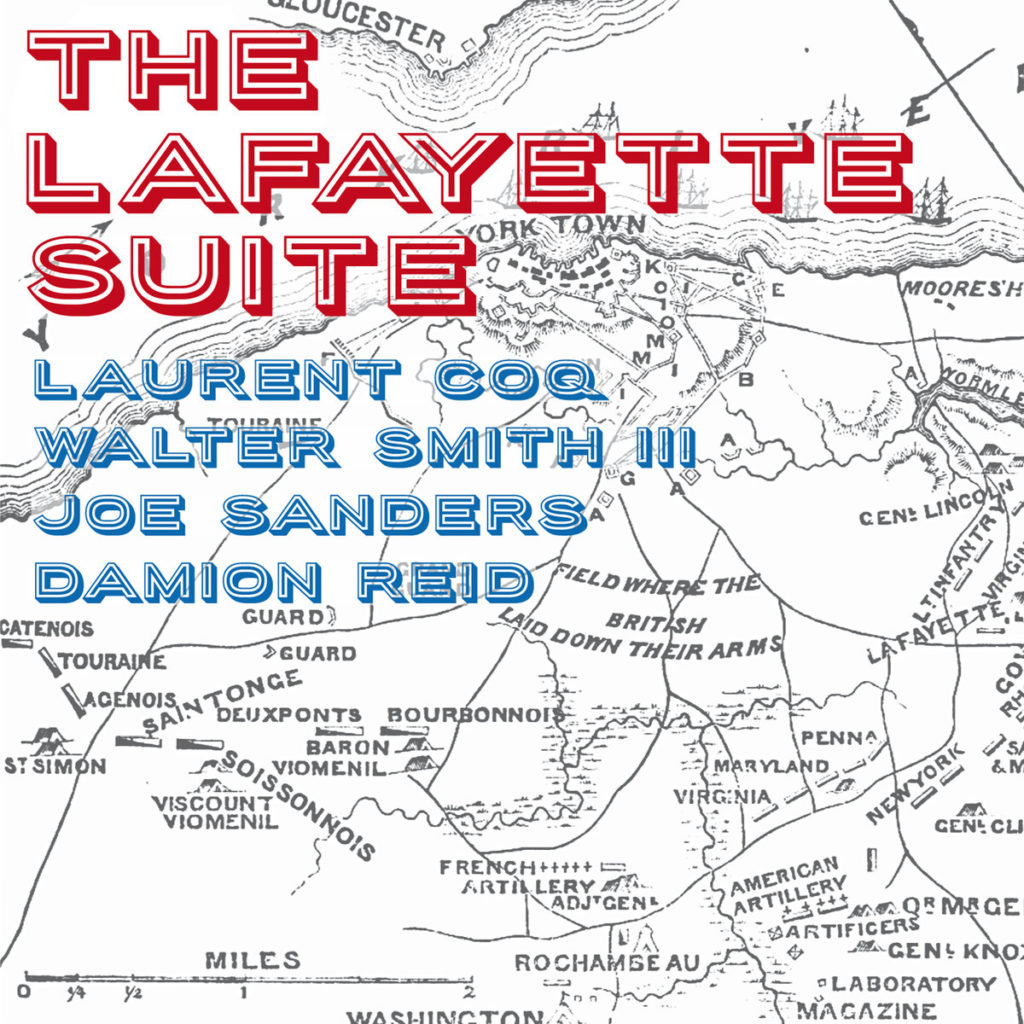
SOUND PROJECTIONS
AN ONLINE QUARTERLY MUSIC MAGAZINE
EDITOR: KOFI NATAMBU
SUMMER, 2022
VOLUME ELEVEN NUMBER THREE
MARC CARY
Featuring the Musics and Aesthetic Visions of:
REVOLUTIONARY ENSEMBLE
(June 11-17)
OLU DARA
(June 18-24)
WALTER SMITH III
(June 25-July 1)
BOBBY WATSON
(July 2-8)
JAMES MOODY
(July 9-15)
RONALD SHANNON JACKSON
(July 16-22)
LEYLA McCALLA
(July 23-29)
GREG LEWIS
(July 30-August 5)
RUSSELL MALONE
(August 6-12)
JOHN HANDY
(August 13-19)
STANLEY CLARKE
(August 20-26)
JASON HAINSWORTH
(August 27-September 2)
https://www.allmusic.com/artist/walter-smith-iii-mn0000333529/biography
Saxophonist Walter Smith III is a forward-thinking musician with a bent toward swinging post-bop jazz and modern creative composition. Along with projects with Joshua Redman and Christian Scott, Smith has garnered attention for his own albums like 2006's Casually Introducing and 2014's Still Casual, the latter of which featured trumpeter Ambrose Akinmusire and guitarist Matthew Stevens. Smith and Stevens also have an ongoing collaboration featuring a revolving lineup showcased on 2018's In Common, 2020's In Common II, and 2022's In Common III.
A native of Houston, Texas, Smith began studying the saxophone at age seven, and by his teens had earned a full scholarship to Berklee College of Music in Boston. In 2003, after graduating Berklee with a degree in music education, Smith earned a Graduate Diploma from the Thelonious Monk Institute of Jazz. He then finished his Masters of Music in Jazz Studies at Manhattan School of Music. As a professional jazz musician, Smith has performed with such luminaries as trumpeter Ambrose Akinmusire, trumpeter Terence Blanchard, drummer Roy Haynes, pianist Eric Reed, and many others. In 2006, he released his debut album as leader, Casually Introducing, and followed it up three years later with Live in Paris.
On 2010's III, he was joined by Akinmusire, along with pianist Jason Moran, bassist Joe Sanders, and drummer Eric Harland. In 2014, Smith returned with Still Casual, which also featured Akinmusire, as well as pianist Taylor Eigsti, guitarist Matthew Stevens, bassist Harish Raghavan, and drummer Kendrick Scott. He then joined fellow saxophonist Dayna Stephens for Reminiscent, and returned to his solo work with the 2018 trio effort Twio, featuring saxophonist Joshua Redman and bassist Christian McBride. Also that year, Smith released In Common, the debut from his collaborative project with guitarist Stevens, featuring Raghavan, Marcus Gilmore, and Joel Ross.
The following year, Smith accepted the position of chair of the woodwind department at the Berklee College of Music. In Common II arrived in 2020 and featured a different lineup with Smith and Stevens joined by Micah Thomas, Linda May Han Oh, and Nate Smith. Following projects with Joel Ross, Dave Stryker, and Connie Han, Smith reunited with Stevens for In Common III, which found them working with veteran bassist Dave Holland and pianist Kris Davis.
https://www.allaboutjazz.com/musicians/walter-smith-iii
Walter Smith III
From a young age, Walter began taking music very seriously. “My first gig was playing at a McDonalds in Houston with another saxophone player. I took a solo on “Blue Bossa.” It was terrible. People clapped, and I figured if I could get away with that and get applause, how could I fail?” Although it may appear Smith is a new voice on the scene, he is widely recognized as an adept performer, accomplished composer, and inspired educator. Smith released his 5th album as a leader, “Twio” in February of 2018 with his longtime trio of Harish Raghavan and Eric Harland including guest appearances by Christian McBride and Joshua Redman. In the Jazz tradition, Smith has developed under the wings of many of the music’s greats. Walter is/has been a member of several legendary groups (recording and/or touring) including the Roy Haynes Fountain of Youth Band, Terence Blanchard Quintet, Eric Harland's “Voyager”, Jason Moran’s In My Mind:Monk at Town Hall, Ambrose Akinmusire Quintet, the Christian McBride “Situation”, Christian Scott group and the Sean Jones Quintet to name a few. Smith has performed all over the world participating in virtually every international festival as well as famed venues such as Carnegie Hall, the Village Vanguard, and the Kennedy Center. In addition, he has shared the stage and/or appeared on recordings with many Jazz notables including Mulgrew Miller, Eric Reed, Billy Childs, Joe Lovano, Herbie Hancock, Dee Dee Bridgewater, Terri Lynne Carrington, Bill Stewart, Ralph Peterson, and a host of others. To date, Walter has appeared on over 100 recordings that are released worldwide. Originally from Houston, TX, Smith now resides in Boston, MA and is the Chair of Woodwinds at Berklee College of Music helping to prepare the next generation of Jazz students.
https://en.wikipedia.org/wiki/Walter_Smith_III
Walter Smith III
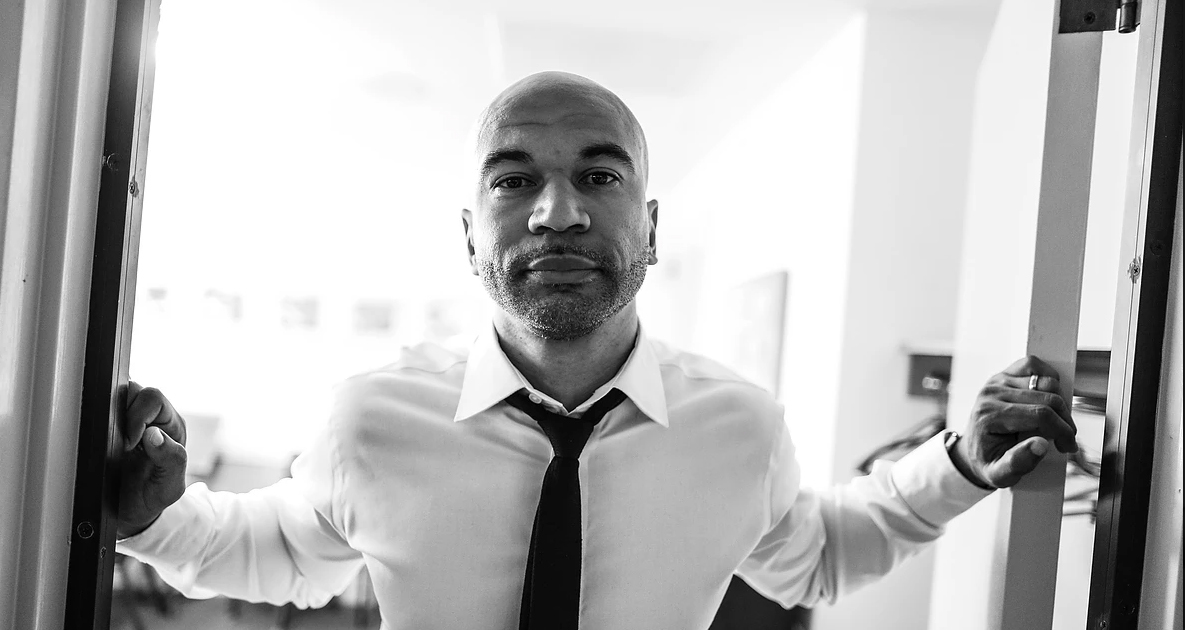
What was the inspiration behind your latest album, “TWIO”?
As with most musicians, I grew up learning standards and getting an understanding of how melody and harmony work from learning hundreds of old songs and listening to recordings from people like Monk, Mingus, Ornette, etc. However, in my life as a professional musician, I’ve always been in bands that tour and record original music (almost exclusively) and it’s very rare that any of that foundational material is ever played. I always knew that I wanted to do something with some of that standard repertoire in a saxophone trio format, and a lot of things came together in the last year that made it feel like now was the time to do it.
Are there any inspirations from your life that have influenced your approach to the saxophone and/or music in general?
I have been influenced by all of my teachers along the way, starting with my father who taught elementary band in Houston, through high school and college. I’ve also been hugely influenced by many musicians through their recordings, which continue to be a big source of inspiration to me. Some of those musicians would be Herbie Hancock, Nicholas Payton, Terence Blanchard, Don Byas, Benny Golson, and countless others. In addition to teachers and recordings, it’s my peers that constantly push me. People that I’ve had the opportunity to tour and record with are constantly setting the bar so high that I am always trying to find a way to improve and keep up with their excellence. Some very important musical relationships in recent years have come out of playing in groups with Ambrose Akinmusire, Logan Richardson, Jason Moran, Eric Harland and many others.
What are some of the differences you’ve noticed between leading a band and being a sideman? Do you prefer one over the other?
Both require an incredible amount of work, imagination, and attention to detail. The biggest challenge of being a leader (besides the stress of putting everything together for recordings and tours) is writing great music consistently. I’ve been lucky to be a sideman to a lot of incredible composers that always meet that challenge and it’s really amazing to play concerts where the music is always great even if the band has an off night. As a sideman, once I put in the time to learn the music, my remaining jobs are to be on time and be professional. For the way that my schedule works, splitting time between LA, my teaching position at Indiana University, and touring internationally, working as a sideman is ideal because I can focus on just concentrating on the music without getting bogged down in the business side of putting together tours constantly. I enjoy the times when I’m traveling as a leader, but if I had to pick, I’ll always pick the path with less emails.
Any valuable lessons that stand out from all the touring and traveling you’ve done as a leader and sideman?
The most important thing that I’ve learned was how to navigate the frequent flier programs of all the airline carriers (thanks to Reuben Rogers) so that I can always maintain status amongst the various airline alliances and have access to early boarding in order to find the highly coveted overhead space for my instrument in addition to other travel perks that make flying a bit more tolerable. I’ve also managed to develop exercise and practice routines that allow me to maintain some sense of normalcy while on traveling for long periods of time and not become a total hotel room sloth.
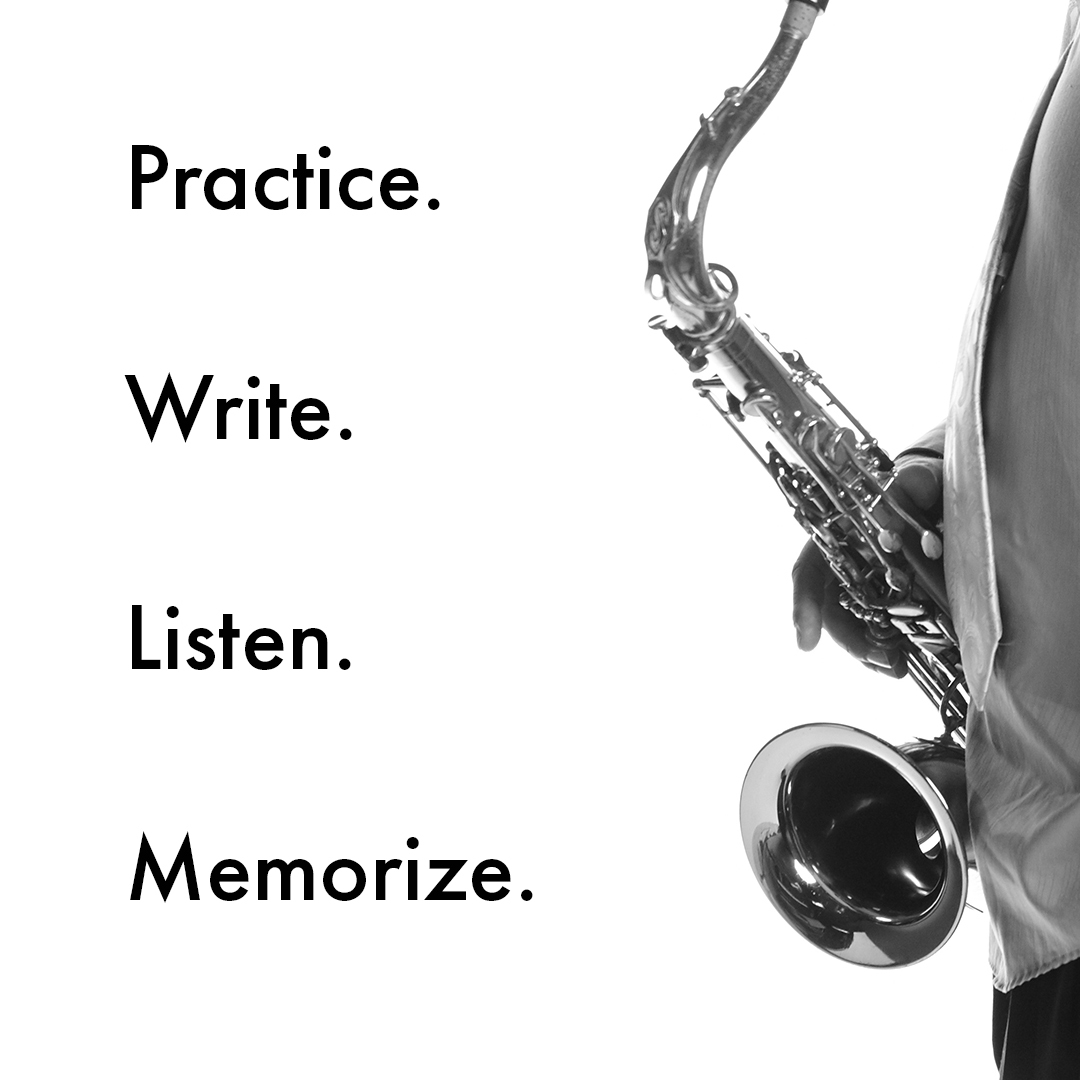
What has been the most memorable moment or performance in your career so far?
I’ve had many that I remember very well, but my first concert as a leader in Europe was pretty memorable. Shortly after my first album was released in 2006, I was invited to play with the band from my album at a festival in Clermont - Ferrand in France. It was memorable because even though I had been to Europe several times at that point for concerts, it was my name that was on the program, and I was pretty nervous about it until we got there and did the sound check and it was just fun to be up there with a bunch of friends. The concert was with Ambrose Akinmusire, trumpet; Robert Glasper, piano; Lionel Loueke, guitar; Vicente Archer, bass and Eric Harland, drums. I remember getting through a few songs and things were going well, and then I took a “bad” solo on one of Robert’s tunes. Then I kept thinking about it the whole time that the next soloist was playing, and then I went back up and took another solo. Turns out 2nd time was not the charm as that solo was worse than the 1st. That’s why the concert was so memorable - I was trying so hard to be good and realized that I should just relax and play and let the music be what it’s going to be. Ever since then, I’ve limited myself to 1 solo per song!
How has your performance career shaped your role as an educator?
I’ve been lucky to tour and record with lots of musicians that many students gravitate towards. I’m always asking questions about what they practice, listen to, and how they approach writing for my own needs as a student of the music. That knowledge has helped shape my own views and approach to music and I feel like having access to all of those brilliant musical minds has been a resource deeper than any one source. In a class, sometimes I’m talking about composition how Terence Blanchard showed me and the next second recalling business advice that Dave Douglas gave me in passing. There is so much stuff that I’ve picked up that I didn’t learn in school that I try and pass on that is very relevant to a young musician starting their career.
Any advice or tips you would like to offer to up-and-coming jazz musicians?
Practice
Write
Listen
Memorize
Play Vandoren Reeds and Accessories!
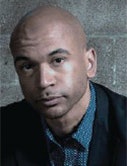
WALTER SMITH III has been appointed chair of the Woodwind Department at Berklee College of Music. Prior to his new role, he served as an associate professor of jazz studies at Indiana University. Smith earned a bachelor’s degree from Berklee College of Music, a master’s degree from Manhattan School of Music and a Graduate Diploma in jazz performance from the Thelonious Monk Institute of Jazz.
https://www.allaboutjazz.com/walter-smith-iii-jazz-explorer-walter-smith-iii-by-rj-deluke
Walter Smith III: Jazz Explorer

"The more I teach, the better I play. And the more I play, the better I teach"—Walter Smith III
More than that, his improvisational path when he solos is unfettered and unpredictable. He's praised by his peers as a saxophonist who is developing his own voice, but retaining ties to the music's illustrious past.
Smith has led his own band and projects, but is a bit reticent about making them a priority. That's understandable if one takes into account the quality of the bands he is a part of, or has been in the past—Akinmusire's quintet, Christian Scott aTunde Adjuah's group, the Sean Jones sextet, Terence Blanchard quintet, Eric Harland's Voyager band, Roy Haynes' Fountain of Youth band, Jason Moran's Big Bandwagon, and the Christian McBride Situation. He brings something top-notch to the table at each juncture.
Nonetheless, each of Smith's own recordings are very strong. His last, 2014's Still Casual, is stellar, accompanied by his contemporaries including Taylor Eigsti on piano, Matt Stevens on guitar, Harish Raghavan on bass, Kendrick Scott on drums with guest spots by Akinmusire. His next will come out this fall, a trio project with Harland on drums and McBride on bass. Joshua Redman plays sax on a couple numbers. It's a menu of jazz standards.
"I usually put my projects last, as far as the priority level," he says. "But I think with this one, it's hard to say. Is it something I'm really into? Like, my last project I ended up liking more and more as I listened to it. I had my manager push to do more work with me as a leader." With the new record, it will depend on his level of excitement. "But if I'm pumped up, I'll try to make it more of a priority. I think it would be fun. [he chuckles] I just don't know if I have the energy to do real trio gigs all the time. That's a lot of playing."
Doing jazz standards "is something I've wanted to do for a while," he says. "I always assumed that would happen a lot earlier, but because of the people that I play with, I ended up doing original music. It's just never come up to do it," he says. When he played some standards, at times it became complicated, where he would play his original forms and chord changes, with a standard melody over it. So at the recording session earlier this year, he decided to "just play them kind of straight."
"It's great. But in a way, I felt like some of the music I was playing—I'm not sure that it sits well with me, because I trying to play in a way that I don't necessarily play all the time," he says.
"Nothing from me is imminent, but once the record comes out [September], I'll see about doing more with the trio," he said.
Among the things keeping him busy, in addition to his multiple sideman gigs, is writing for projects that are are on the horizon. "I'm starting to write for a project I'm going to do next year, and one I'm going to do the year after that. The band from my last record—a quintet—I'm planning to record that in two years, so I'm trying to get a fresh batch of music finished for that. And next year I'm thinking of dong a duo project and I'm working toward writing music for that."
Smith got into jazz at an early age. His father, from New Orleans, was a saxophonist and when he started a family in Texas, he taught band in his son's elementary school. Growing up, his favorite sax players were Kirk Whalum and Gerald Albright. Though then he found Charlie Parker, and in high school the sounds of Kenny Garrett, Branford Marsalis, Joshua Redman and Mark Turner caught his ear. At the Berklee School of Music, which he attended on scholarship, he researched the classic players—Lester Young, Coleman Hawkins, Wayne Shorter.
"Ornette Coleman became big for me when I was in college. That sound really appealed to me. Eric Dolphy," says Smith. "Later on Sam Rivers was very interesting to listen to. Joe Lovano. All those guys. I found similarities in all of them and it was not uncommon for me to be listening to something from the 1930s and then next thing I put on was 2003. That kind of thing. They have such similarities, it was easy for me to find influential things within all of them."
Early on, he realized jazz was his thing and the direction he would go.
"There's a certain exclusivity about it in the beginning and everything kind of sounds the same. You don't really pick up on a lot of what's happening when you're listening to it. Then as you start to learn more about it, it becomes even more interesting," he says.
"I remember one time going to a master class. In Houston we had a limited number of people who actually came through town. But one of the guys that came when I was in ninth grade was Terence Blanchard. He did a workshop. He was talking about how to listen to music. He said don't always listen to the soloist. Listen to Wayne Shorter, but listen to how Herbie [Hancock] comps for him. That night I sat down with records I had been listening to forever and I listened to them that way. I was like, 'Oh my god. There's so much.' The conversational element of it. Then trying to think of ways to actually make that happen with other people. Then realizing they had been doing that all along, I just wasn't aware. That whole discovery process, between listening then actually trying to be a part of it by playing. Trying to become better at that."
Press
Laurent Coq and Walter Smith III album shows audacity, in the present day ; full of lifeblood, reflection and joy.
--Francis Marmande, Le Monde
These
are artists executing at the height of inventiveness (…) The quartet
operates on an almost subliminal level executing the art of composition
and improvisation (…) Jazz in particular is an art form of individualism
but more so, partnership, as this outstanding recording illustrates.
--Mark F. Turner, All About Jazz, 4,5*
A suite of beautiful musicality, possessed with an high idea of destiny
--Franck Bergerot, Jazz Magazine / * * * *
Following its inspirator, this jazz ventures on side roads, transcends
compositions and glorifies them through a synthesis of thoroughness and
improvisation
--Christian Larrède, Jazz News / Sélection
The music in itself is a story ; built with science, sung with virtuosity, told with a simple grace
--Pierre Tenne, Djam
Four exceptional solists united by sincerity, beyond the symbol
--Lorraine Soliman, Politis
A successful undertaking that surely ups the profile of both players as composers
--Marlbank.com
(…) Laurent Coq has many things to say and share. To such an extent
that his music becomes an art of the conversation with the musicians
that gather around him (…) His understanding with Walter Smith III is so
remarquable that it is the sign of a prefect symbiosis.
--Jean-Marc Gélin, Les Dernières Nouvelles du Jazz
https://www.allaboutjazz.com/twio-walter-smith-iii-whirlwind-recordings-ltd-review-by-roger-farbey
| Play Walter Smith III on Amazon Music Unlimited (ad) | |
The lively opener, Monk's "Ask Me Now" is indicative of Smith's feisty yet sensitive approach to the album. "We'll Be Together Again," here only accompanied by Eric Harland on drums, proves that Smith can play just as effectively in ballad mode, lovingly teasing out every last note of the melody. Wayne Shorter's "Adam's Apple" evinces a satisfyingly robust outing, with the lack of a chordal instrument proving inconsequential yet again. Jimmy Rowles's "The Peacock" is given a sombre, pensive treatment by Smith, to some extent channelling—but not copying—the original 1975 Stan Getz recording.
The humorous false start to Gigi Grye's "Social Call" gives a clue as to the atmosphere surrounding this relaxed and good natured session with Smith and guest bassist Christian McBride performing a short yet pleasing duet. Smith has worked with many leading figures in jazz including Roy Haynes, Terence Blanchard and Joe Lovano and this follow-up to 2014's Still Casual, consolidates his talent and reinforces the proposition that he now must surely rank highly amongst the finest saxophonists playing today.
Track Listing
Ask Me Now; Nobody Else But Me; On The Trail; We'll Be Together Again; I'll Be Seeing You; Adam's Apple; The Peacocks; Social Call; Contrafact.
Personnel
Walter Smith III: tenor saxophone; Harish Raghaven: bass (1,2,6-7); Eric Harland: drums; Guests: Christian McBride: bass (3,5,8-9); Joshua Redman: tenor saxophone (3,9).
Album information
Title: Twio | Year Released: 2018 | Record Label: Whirlwind Recordings Ltd
Tags
WALTER SMITH III: THOSE THAT CAN, TEACH!
“Instruct a wise man, and he will be wiser still; teach a righteous man, and he will increase his learning”
Proverbs 9:9
RARE IS THE ARTIST THAT RE-ASSESS HIS CRAFT DURING THE ASCENT OF HIS CAREER, BUT THAT IS WHAT TENOR SAXIST WALTER SMITTH III HAS DONE. DURING THE EARLY DAYS OF HIS CAREER, WITH ALBUMS LIKE LIVE IN PARIS AND CASUALLY INTRODUCING, SMITH HIT THE GROUND RUNNING WITH AN ASSERTIVE AND BOLD APPROACH TO HIS PLAYING AND COMPOSING.
HIS LATEST ALBUMS,HOWEVER, HAVE REVEALED A SOFTER, MORE LYRICAL AND PALPABLY MELLOWER APPROACH. HIS RECENT ALBUM,TWIO, IN WHICH HE RE-INTERPRETS STANDARDS, AS WELL AS HIS HOT OFF THE PRESS IN COMMON (WHICH HAS HIM DELIVERING ORIGINAL MATERIAL) ARE BOTH THE CREATION OF AN ARTIST THAT HAS TAKEN THE COURAGE TO CHANGE DIRECTION.
BALANCING THE CAREER OF BOTH PERFORMER AND TEACHER, SMITH IS STILL A STUDENT AT HEART, AND HE PASSES ON HIS OWN LESSONS TO HIS STUDENTS.
WE HAD A CHANCE TO CATCH UP WITH SMITH AND DELVE INTO HIS THEORY AND PRACTICE OF ART AND CRAFT
YOUR CAREER STARTED WITH A SCHOLARSHIP. HOW DID YOU GET THAT?
I’m from Houston, Texas. Berklee College of Music has this thing called The Scholarship Tour where you go all around the country and world, hosting local auditions.
They came to Austin, so a bunch of my buddies and I drove there. Drummer Kendrick Scott and bass player Mark Kelly and I went there. Just through that audition we got to play some songs and they test your knowledge on theory. All that kind of stuff with a couple Berklee professors, one of which was (tenor saxist) Bill, who became one of my main mentors.
They make suggestions on who should get what, and I got a scholarship to go.
YOU WENT ALL THE WAY TO GET A MASTERS DEGREE. WHAT IS THE BENEFIT OF THAT AS A MUSICIAN?
It just depends upon what you want your career path to be. My undergraduate degree is in Music Education. My plans were to get into a college position and become a professor somewhere. In order to do that, there are a certain amount of qualifications to have, just like with any other job. A Master’s Degree was a means to an end in that respect. These days people are going for DMAs (Doctor of Musical Arts) as well.
ARE YOU DOING A LOT OF TEACING HOW
The last three years I’ve taught in Indiana, commuting back and forth to LA. Next year I’ll be starting at Berklee College of Music as the Chairman of the Woodwind Department.
WHAT IS THE MAJOR THING YOU TRY TO EMPHASIZE TO YOUR STUDENTS?333
****Be creative, and you have to be yourself despite what anyone may tell you about what they think of your playing. You can’t judge and base your future on decisions both musically or professionally on what other people tell you. You can take their advice, but ultimately you have to forge your own path and be confident in the decisions that you make.
THERE’S THE OLD JOKE “THOSE THAT CAN’T, TEACH.” THE FACT THAT YOU DO BOTH GIVES CREDIBILTY TO EACH PART OF YOUR CAREER. YOUR PLAYING GIVES BACKBONE TO WHAT YOU’RE SAYING IN CLASS.
That’s always been an important thing to me. It’s good for everybody; it’s good for me because I’m active and thinking about all of the stuff I’m talking about. For the students, they get excited about what you’re doing, so there’s a back and forth energy cycle.
Last week I played at the Blue Note in New York with Robert Glasper for a few nights, and one of my students is obsessed with his band. He was all excited, “What was it like?!? Etc” so it’s fun for them as well as for me.
YOU SPENT SOME TIME WITH ERIC REED AND ROY HAYNES IN YOUR EARLY YEARS. WHAT DID YOU LEARN FROM THEM?
From Roy Haynes I learned to pay a lot of attention to melody. He taught to think about how specifically the melody is to be played.
I also made some of my earlies “road” mistakes with him. Like oversleeping, and he’s not the guy that’s going to wait for you or call your room. I was about ten minutes late and I came running downstairs and they were just about to leave for the airport. You assume that it’s all going to be cool, but no, I had to learn to be a lot more professional about it.
Playing with him I also learned that I’m really bad at playing soprano saxophone (laughs)
As for Eric Reed, I didn’t play with him too much. He called me for my first gig in New York, and it was a “sink or swim” thing.
He called for this gig; it was in one hour. He gave me a list of something like thirty songs that I needed to know for the gig, and they were all hard. I had never even heard of a lot of them!
Trumpet player Mike Rodriguez was on the gig, so we just got together for a number of days and played through them as quickly as possible. It was like “if you’re going to be hear, and it’s going to work for you, you’ve got to be serious and know as much as you can.
A GENERATION AGO, A MUSICIAN LIKE YOURSELF STARTED A CAREER AS A SIDEMAN IN A BIG BAND OR SMALL GROUP FOR A NUMBER OF YEARS BEFORE GOING OUT ON HIS OWN. YOU SEEM TO HAVE SPENT A LOT OF TIME TEAMING WITH FELLOW NEWCOMBERS AMBROSE AKINMUSIRE AND ERIC HARLAND . WAS THAT OUT OF CHOICE; IS THAT THE WAY NEWER ARTISTS GET INTO THE SCENE THESE DAYS?
It’s kind of both these days. It’s nice to spend some time with guys that are older, but the reality of the situation is that there aren’t as many of those gigs around as there used to be twenty years ago.
I think it’s because the “Young Lions” changed the scope of the scene. What you had was Josh Redman and Roy Hargrove who played with older musicians, but are mostly known as bandleaders. That transferred into our generation with everyone coming into New York writing their own music and putting their own band together. There was a big importance on being established so others know who you are, and that would be the reason to get hired by the older generation of musicians. It’s kind of backwards now.
A BIG CHANGE HAS COME OVER YOUR PLAYING THE PAST FEW ALBUMS. YOUR TONE IS MUCH CALMER, SOFTER AND MORE FLUFFY. IS THIS A MATTER OF AGING, BEING A TEACHER OR ATTRITION?
It was something deliberate. Not until two albums ago could I even listen to I even listen to myself on a record. It was just too wild and out of control,
There are things that I look back on from the early stuff where I can appreciate what I was going for, the energy and the attitude. But as you change as a person and get older, you want to refine a little bit. I’ve wanted to get closer 1022 to that feeling of “this is something I can enjoy” whether I am looking at it as a musician or as a normal listener who’s not thinking about whether or not it’s a minor seventh and stuff like that.
SO YOU CONSCIOUSLY WORKED ON ROUNDING OF THE EDGES
I’ve been working with my equipment and listening very critically to myself. I then make myself a promise “I’m never going to do that again (laughs).
Once you get really comfortable with how you play and with certain decisions you make in the moment, and put roadblocks in front of some of the things you don’t like, you can lead yourself to something else even if you don’t know what it is. It’s an “anything but that” kind of move.
**********
when you’re really young, you think “I don’t want to sound like any of those older guys. I don’t want this; I don’t want that.” But as you get older, it’s kind of like the ONLY thing I want to sound like.
***********
AFTER LISTENING TO THESE LAST FEW ALBUMS, I THOUGHT “SOMEONE TOOK HIS LESTER YOUNG PILLS THIS WEEK!”
(laughs) Sometimes, like me, when you’re really young, you think “I don’t want to sound like any of those older guys. I don’t want this; I don’t want that.” But as you get older, it’s kind of like the ONLY thing I want to sound like.
YOUR GENERATION ALSO SEEMS TO ALWAYS PUSH THE MUSIC AND BOUNDARIES FORWARD WITH MIXES OF ROCK AND HIP HOP. IS THERE ANY THOUGHT OF GOING MORE TRADITIONAL AND DO STANDARDS?
I think that the attitude of pushing forward is about writing your own music and bringing in other elements to whatever the music is. If it’s a different groove or a rhythm or certain type of chord progression…all of that music that you want to put in there to define a sound that is unique.
As people say, it’s not necessarily anything that is “new,” but you use certain combinations to help you suit the way that you play.
I think that just by the fact that you’re playing older music and standards you’re going to push it forward a little bit. We don’t base our decisions on records we’ve necessarily heard before, but more on how you write and what other bands you have played with.
If you play in a small band that only plays standards, it’s going to sound more traditional. But if you think about someone like Ambrose and who he’s played with, if he sits down to play “Stella By Starlight” it’s not going to be like Miles Davis. It will be totally different just because of who he’s played with and how he hears music. It will be a familiar song, but what’s going to come out of his horn, but it could be even different from his own material as you’ll hear elements of the song, but with things that are not expected.
I don’t think there’s anything wrong with not trying to push. We need all of those different aspects. My last album was a trio record just playing standards. For that whole thing I sat down and wrote arrangements, reharmonized them and when I then played through them for some people, it felt like “Why did I do that? I’m not even playing the tunes anymore.”
That was my first thought; if I’m going to do standards I’m going to make them my own. But I then had this conversation with myself that I’m going to play these songs and just let our influences and how we play be what directs the song.
So, if you listen to them, they are now still familiar, and in 4/4 and swing, but they’re coming from a different perspective at all times, so they are still nudging towards being forward thinking.
***********
“I then had this conversation with myself that I’m going to play these songs and just let our influences and how we play be what directs the song.”
************
YOU’RE ALSO ON TWO NEW ALBUMS, BILL STEWART’S BAND MENU AND REUNITED WITH MARCUS GILMORE ON IN COMMON. HOW MUCH DO THESE TWO DIFFERENT TYPES OF DRUMMERS AFFECT YOUR SOLOING AND PLAYING?
If you’re really listening and playing in the moment, whatever someone is doing will have a real effect on how you play. With Stewart, he has played with so many people like John Scofield and Maceo Parker. He’s incredible; he wrote those songs after we had done a week at the Vanguard, thinking what might work well with the group. When we did the recording, it was like a run-through of all of that music. But we just did another run at the Vanguard, and the music wasn’t mellow at all. Everybody was more comfortable with the music, and it went a lot of different places that it doesn’t do on the album, which is great and always the sign of a song being a good vehicle for improvisation.
He’s very conscious of not making everything about the soloing for as much or as long as you can, and I fall in line with this as well. It’s more about hearing the song and letting it develop, with the solo being a bonus and not the main part of the song.
YOU DO THE SAME THING WITH YOUR OWN COMPOSITION ON THE ALBUM, “APOLLO.” YOU GIVE A LOT OF SPACE TO BILL, AND TO LARRY GRENADIER.
Look, when you’re not the smartest person in the room, shut up! (laughs)
PLAYING THE MELODY PERFECTLY AND DOING JUST A COUPLE OF CHORUSES WILL ALWAYS ENDEAR YOU TO THE AUDIENCE AND OTHER MUSICIANS
If you go down to Small’s any night and Roy Hargrove is in town, he’s going to come in and play. There will be some jam session with a lot of cats trying to be discovered, so they’re playing their hearts out doing 5-6 choruses. Roy walks in and he’ll play only one chorus or a half chorus, and it’s incredible. It was short and we loved it, and he just walks off.
FOR THE IN COMMON ALBUM, THERE’S A DIFFERENT REPORT WITH GILMORE.
Gilmore has a way of playing that feels like the second anything starts to happen he has been setting that thing up. You don’t even realize that he was getting ready for that the whole time, and you think that you just did it, but he was pushing you towards that same mark.
He’s also played with a lot of people, so the time feel is there; it’s loose but exact and you can fall into a lot of those little cracks so it feels very freeing.
WHAT’S NEXT FOR YOU AS A LEADER, WITH YOUR CHANGED TONE AND WRITING SKILLS?
************
“Look, when you’re not the smartest person in the room, shut up!”
************
There are about five albums coming out in the next few weeks recordings with other artists. As far as my own projects. As far as my own material, I have some ideas but I haven’t fleshed them out yet.
YOU ALSO HAVE A FAMILY. HOW DO YOU WORK OUT THE BALANCE BETWEEN RECORDING, TEACHING, AND PERFORMING WITH SOME SEMBLANCE OF A STABLE FAMILY?
It’s always a work in progress, as there are times when you’re really killing it as far as family time, and other times as playing. The balance is in trying to make home time the priority, while realizing that in order for home time to exist you need to be working hard.
We’re getting ready to move to Boston to do this Berklee thing, so now with teaching, the home side of things will be more stable in one place instead of three. That was our reasoning; I’ll be home, go to Berklee and come back home so only during gigs will I be leaving.
WHAT KEEPS YOU GROUNDED IN ALL OF THESE THINGS; YOU SEEM TO HAVE A BALANCED VIEW OF LIFE.
I wouldn’t say anything specific, but just a general way of going through life to be kind and be positive about everything. Not just “because,” but because I think it’s really healthy for someone that’s in something like the music world.
If you see people that are really negative about everything, it can be a very isolating way of life. It doesn’t serve anyone. On the other side, I have friends all over because I stay positive, and I can go play in whatever country and people will come out, hang and go to dinner or something.
That is just based on relationships with people. When you sit down and write music, it comes out in the writing; when you practice it comes out, as you don’t get frustrated the same way. You just say to yourself, “I’ll get it,” and when I do, I know that there will be something else I will try to get to.
So, you can never really feel like you’ve accomplished anything, but when you look back on what you’ve done, you can see that there are things you’ve done, but you don’t rest on that. There are still people that I want to play with. There are still things I need to learn and do, and time is limited; I’m 38 and half way done!
************
“The balance is in trying to make
home time the priority, while realizing that in order for home time to
exist you need to be working hard.”
************
THAT’S A GREAT ATTITUDE. YOU DIDN’T GET IT FROM A SPECIFIC FRIEND OR FAMILY MEMBER?
It’s something I’ve learned along the way. I remember getting to college, and the piano player Aaron Goldberg came down to a gig where I was playing. I was maybe 17 at this point.
I loved the record that he had out at the time, and I told him how amazing it was, blah, blah, blah. He asked me, “Have you ever heard of this album? You should check it out.” He was trying to get me off of just new music and check out some older stuff.
I would say, “I really don’t like that. It sucks. That’s not cool, either. ” He just stops me and says “In the last five minutes you’ve just dissed the entire catalogue of the jazz that everybody loves.”
So I started thinking, “Why am I thinking that way?” and it was just because a defensive thing. I hadn’t actually listened to any of those guys, so I did that so I wouldn’t be embarrassed not knowing about it. It was all because I was insecure.
I then realized that if I’m going to do this I need get serious; I’m going to have to study it, practice it and learn it and listen to what other people that are smarter are telling me.
That was just one person, but you see people along the way and how they make you feel when you’re around them. Jimmy Greene is one of those people. Just that vibe, and I just prefer “this” to “that.”
I want to be the guy like the people who give me that feeling, and not the ones that I’m with and feel depressed.
ONE OF THE GREATEST IMPEDIMENTS TO GROWING AS A MUSICIAN, AS WELL AS A HUMAN, IS PRIDE. IT PREVENTS US FROM HUMBLY EVALUATING OURSELVES, AND TAKING ADVICE FROM OTHERS IN ORDER FOR US TO BE THE PEOPLE THAT GOD CREATED US TO BE.
IN THIS DAY OF SELF-EXALTATION, IT’S REFRESHING TO COME ACROSS A PILGRIM SUCH AS WALTER SMITH III, WHO HAS LEARNED THE VALUE OF HUMBLE SELF EXAMINATION AND BE WILLING TO CHANGE DIRECTION. AS THE BIBLE SAYS, “HE WHO EXALTS HIMSELF WILL BE HUMBLED, AND HE WHO HUMBLES HIMSELF WILL BE EXALTED.”
AS A TEACHER, IT IS A GIFT THAT WILL BE APPRECIATED FROM HIS STUDENTS, BOTH IN THE CLASS ROOM AND IN THE JAZZ NIGHTCLUB.
http://www.third-story.com/listen/waltersmith3

Smith has performed all over the world participating in virtually every international festival as well as famed venues such as Carnegie Hall, the Village Vanguard, and the Kennedy Center. In addition, he has shared the stage and/or appeared on recordings with many important artists including Mulgrew Miller, Billy Childs, Joe Lovano, Herbie Hancock, Maria Schneider, Dee Dee Bridgewater, Terri Lyne Carrington, Ralph Peterson, and a host of others. To date, Walter has appeared on over 100 recordings that are released worldwide.
Originally from Houston, TX, Smith now resides in Boston, MA and is Chair of Woodwinds at Berklee College of Music helping to prepare the next generation of young artists.
We spoke recently about his early development, the Houston sound, his thoughts on education, practice, improvisation, leadership, raising a family as a musician, meeting your heroes, and LA real estate.
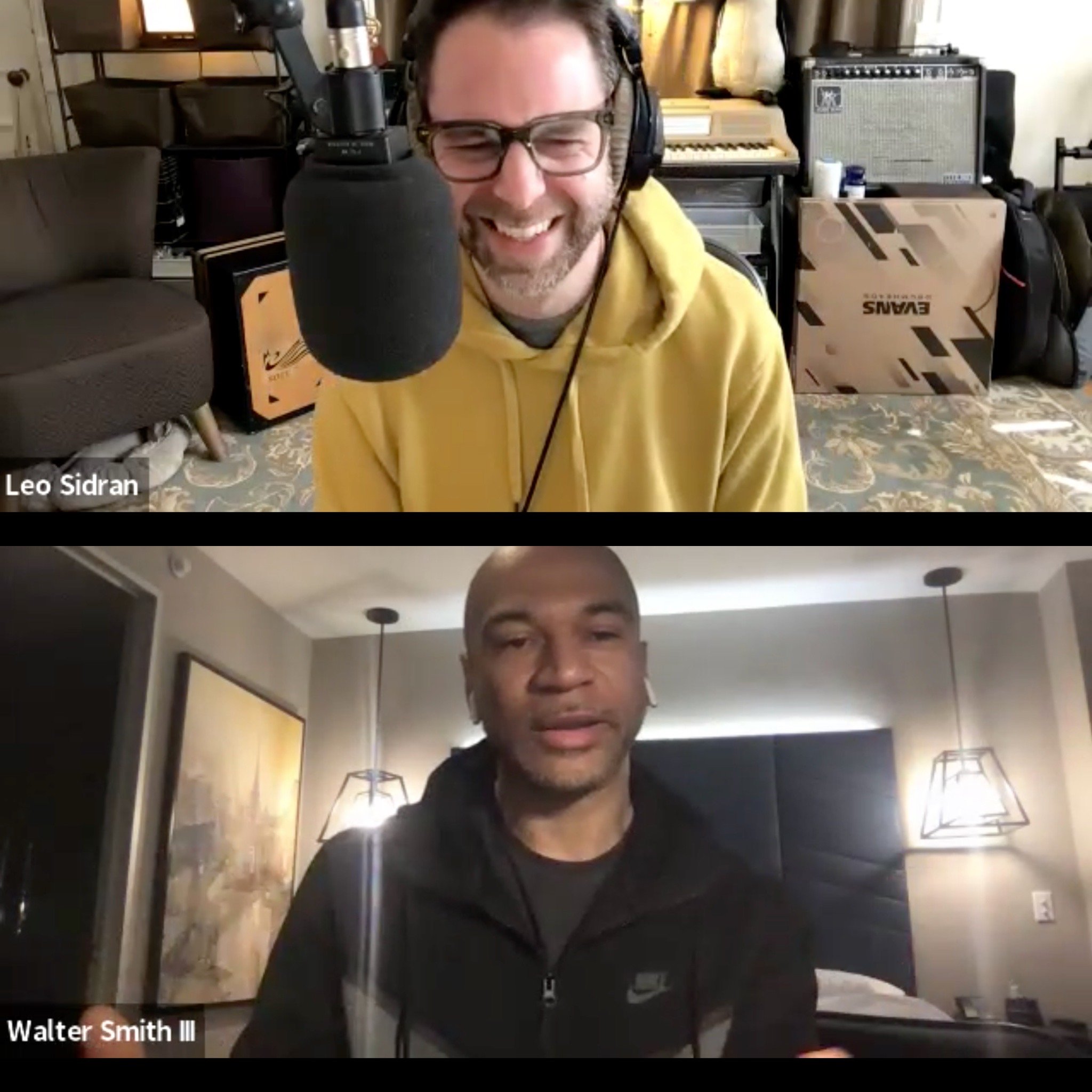
Zooming With Walter Smith III, April 2021
Thanks for listening. If you enjoyed it, please leave a review on Apple Podcasts and consider supporting the podcast on Patreon and following the podcast on WBGO Studios, Twitter, Instagram and Facebook.
